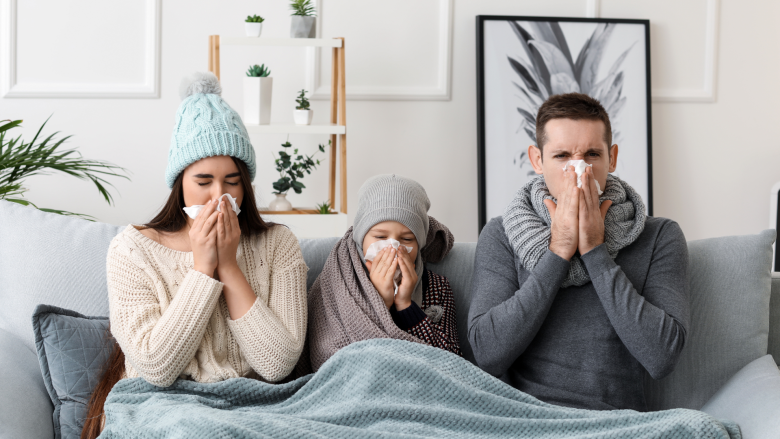Cold, flu, and sore throat are the three most common types of viral illnesses affecting the general population. These illnesses usually produce a range of symptoms including sneezing, a runny nose, headache, body aches, and fever. While there are many contributing factors to these illnesses such as environmental factors that can cause an illness to develop at any time during the season, it is important to understand what compels these diseases to occur.
We all know that colds and the flu is a highly contagious diseases, but do you know what caused them? This article will tell you about the causes of these illnesses, so you can be prepared with all the information to keep yourself from getting sick.
What Causes Cold, Flu, And Sore Throat?
The viruses that cause colds, flu, and sore throat are spread through the air. They are also spread through contact with bodily fluids, such as saliva or mucus. These viruses can be caught by anyone, even if they don’t have the symptoms of the illness.
Understanding the root causes of common winter ailments like colds, the flu, and sore throats goes beyond just seasonal viruses. Allergies, often overlooked culprits, can contribute significantly to these health issues. As we spend more time indoors during colder months, airborne allergens like dust, mold spores, and pet dander increase, triggering or exacerbating symptoms. Investing in a high-performance air filter for your furnace can be extremely helpful in mitigating allergy-induced health problems. A 16x25x4 furnace filter, for instance, can effectively capture and trap microscopic particles, preventing them from circulating in your home’s air. By minimizing allergen exposure, these filters not only alleviate allergy symptoms but also play a proactive role in preventing colds, flu, and sore throats.
That said, cold, flu, and sore throat can be caused by a number of viruses, including:
The common cold
This is a viral infection of the nose, throat, and respiratory tract. It is caused by a variety of viruses, including rhinovirus (the most common type), coronavirus, and adenovirus. Symptoms include a persistent or recurrent cold with nasal congestion, a sore throat, fever, headache, muscle aches, diarrhea, or nausea. It can last for up to two weeks.
The flu
This is an illness caused by a virus that attacks the respiratory system. Symptoms include fever (usually above 37C [99F]), coughing, sneezing, chest pain, fatigue (especially after exertion), headache, increased heart rate, and decreased appetite. Flu can last for several days to a week and can be very serious in young children and the elderly. Pregnant women are at higher risk of developing complications from the flu.
Sore throat
This is an inflammation of the throat typically caused by strep throat bacteria (Streptococcus pneumoniae). Symptoms include swollen glands in the neck below the jawline (swollen tonsils), difficulty swallowing or speaking due to pain in the neck or larynx (voice box), and hoarseness or soreness.
Symptoms Of A Cold, Flu, And Sore Throat
The three main symptoms are a runny nose, achy muscles, and a sore throat. A runny nose is caused by the inflammation of the nasal passages, which causes the mucus membranes to produce more mucus than normal. This excess mucus can drip down the back of the throat, which is why a runny nose is often accompanied by a sore throat. Achy muscles are caused by the flu virus, which attacks the body’s muscles and joints. The sore throat is caused by the inflamed tissues in the throat.
How To Treat A Cold, Flu, Or Sore Throat
Home Remedies
There are a few different ways that you can treat a cold, flu, or sore throat. Some home remedies include drinking warm liquids, such as tea or soup, gargling with warm salt water, and using a humidifier.
Over-The-Counter Treatments
There are many over-the-counter treatments available to treat a cold, flu, or sore throat. However, it is important to consult with a healthcare professional to determine which treatment is right for you. Some common cold and flu treatments include:
- Antihistamines – to relieve congestion and sneezing
- Antipyretics – to reduce fever
- Decongestants – to relieve nasal and sinus congestion
- Steroids – to reduce inflammation
- Cough suppressants – to relieve cough
- Antitussives – to reduce cough
- Expectorants – to help loosen and expel mucus from the lungs
- Pantoprazole – to reduce stomach acid
- Antiemetics – to relieve nausea and vomiting
- Antivirals – to treat viral infections
- Ibuprofen or acetaminophen – to help relieve pain and fever
However, it is important to remember that these treatments will not cure a cold or flu, but can help to relieve symptoms. If your symptoms are severe, you may need to see a doctor. He may be able to advise you on the Best Sinus Irrigation System or suggest other treatments or more specific therapies, depending on your specific need.
Prevention Methods For A Cold, Flu, Or Sore Throat
There are a few things you can do to help prevent a cold, flu, or sore throat. First, make sure to get plenty of rest and keep yourself warm. When you’re not getting enough sleep, your immune system is less effective at fighting infections. Similarly, sleeping in cold temperatures can put additional strain on your immune system, making you more susceptible to illnesses. To prevent this, it would be wise to consult with a gas fireplace company Red Deer, or locally, so that you could find a suitable type of hearth to get warm and cozy by during those freezing times; especially if you live in a cold place or one susceptible to freezing temperatures in the winter.
Alternatively, you could also go for an HVAC system, which would give you the benefit of having central heating. This means a warm and regulated temperature throughout the home, in every room where there is a vent. Now, these systems run on different kinds of heating fuels. Therefore, to keep your house warm, ensure you stock up on heating fuel from firms like dutchoil.com and get your heating systems inspected and repaired before the winter season.
Second, try to avoid contact with people who are sick. It’s not always possible to steer clear of others, but maintaining distance will help reduce the chances of spreading the illness. Finally, drink plenty of fluids and stay hydrated. Your body needs water to fight infection, and dehydration can lead to feeling tired and weak.
Many people find themselves struggling with cold, flu, and sore throat at some point in their lives. There are many potential causes of these ailments, but the most common one is a virus. In order to prevent yourself from getting sick every time you catch a cold or flu bug, it is important to understand how these viruses work and what you can do to protect yourself. By following some simple tips and using the resources available on this website, you can help keep your immune system strong so that you don’t fall victim to these pesky illnesses ever again.



